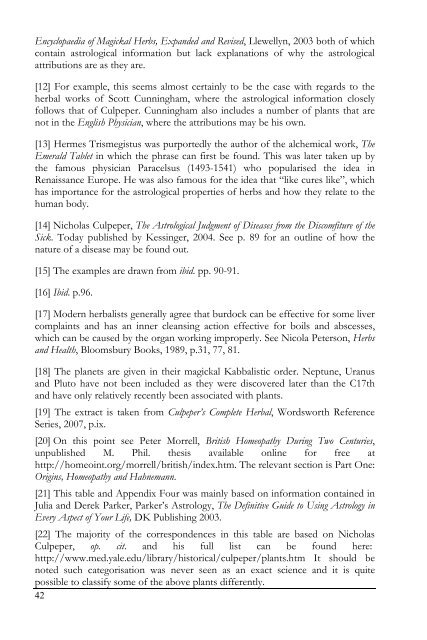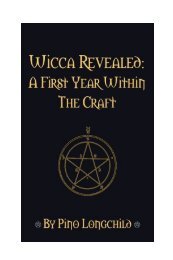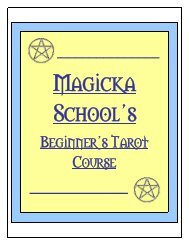A Magickal Herball Compleat.pdf - Magicka School
A Magickal Herball Compleat.pdf - Magicka School
A Magickal Herball Compleat.pdf - Magicka School
Create successful ePaper yourself
Turn your PDF publications into a flip-book with our unique Google optimized e-Paper software.
Encyclopaedia of <strong><strong>Magicka</strong>l</strong> Herbs, Expanded and Revised, Llewellyn, 2003 both of which<br />
contain astrological information but lack explanations of why the astrological<br />
attributions are as they are.<br />
[12] For example, this seems almost certainly to be the case with regards to the<br />
herbal works of Scott Cunningham, where the astrological information closely<br />
follows that of Culpeper. Cunningham also includes a number of plants that are<br />
not in the English Physician, where the attributions may be his own.<br />
[13] Hermes Trismegistus was purportedly the author of the alchemical work, The<br />
Emerald Tablet in which the phrase can first be found. This was later taken up by<br />
the famous physician Paracelsus (1493-1541) who popularised the idea in<br />
Renaissance Europe. He was also famous for the idea that “like cures like”, which<br />
has importance for the astrological properties of herbs and how they relate to the<br />
human body.<br />
[14] Nicholas Culpeper, The Astrological Judgment of Diseases from the Discomfiture of the<br />
Sick. Today published by Kessinger, 2004. See p. 89 for an outline of how the<br />
nature of a disease may be found out.<br />
[15] The examples are drawn from ibid. pp. 90-91.<br />
[16] Ibid. p.96.<br />
[17] Modern herbalists generally agree that burdock can be effective for some liver<br />
complaints and has an inner cleansing action effective for boils and abscesses,<br />
which can be caused by the organ working improperly. See Nicola Peterson, Herbs<br />
and Health, Bloomsbury Books, 1989, p.31, 77, 81.<br />
[18] The planets are given in their magickal Kabbalistic order. Neptune, Uranus<br />
and Pluto have not been included as they were discovered later than the C17th<br />
and have only relatively recently been associated with plants.<br />
[19] The extract is taken from Culpeper’s Complete Herbal, Wordsworth Reference<br />
Series, 2007, p.ix.<br />
[20] On this point see Peter Morrell, British Homeopathy During Two Centuries,<br />
unpublished M. Phil. thesis available online for free at<br />
http://homeoint.org/morrell/british/index.htm. The relevant section is Part One:<br />
Origins, Homeopathy and Hahnemann.<br />
[21] This table and Appendix Four was mainly based on information contained in<br />
Julia and Derek Parker, Parker’s Astrology, The Definitive Guide to Using Astrology in<br />
Every Aspect of Your Life, DK Publishing 2003.<br />
[22] The majority of the correspondences in this table are based on Nicholas<br />
Culpeper, op. cit. and his full list can be found here:<br />
http://www.med.yale.edu/library/historical/culpeper/plants.htm It should be<br />
noted such categorisation was never seen as an exact science and it is quite<br />
possible to classify some of the above plants differently.<br />
42




